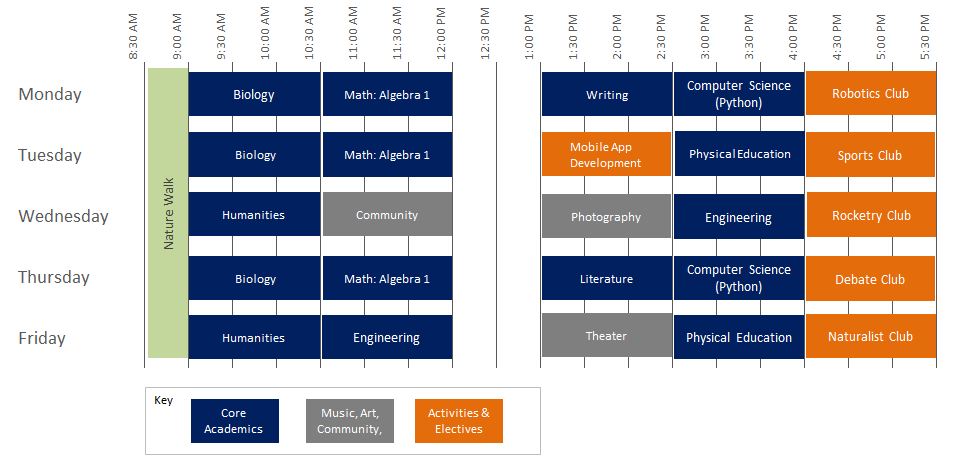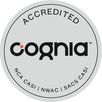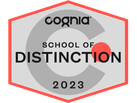IDEAVENTIONS ACADEMY
Upper Elementary (4th-5th)
Learning is joyful and full of questions. Our interdisciplinary curriculum for the gifted builds foundational skills in reading comprehension, analytical thinking, creativity, research, and oral and written communication. Through advanced literature, science and mathematics coursework, students gain experience gathering and analyzing data, learn science and engineering practices, and grow collaboration and communication skills.
Classes are block schedule and delivered in 85-minute sessions
Classes are block schedule and delivered in 85-minute sessions
Mathematics
|
Core Curriculum
|
Problem Solving and Competition Math: We believe that problem solving can be practiced and learned. We also recognize that it takes time and difficult math problems in order to be able to work through them. Our 4th & 5th grade students learn problem solving skills and put them to practice with the Math Olympiads.
Games: Through games and hands-on activities, students learn how engaging and fun math can be. |
English & Language Arts
|
Reading: Students think critically about what they are reading so that they can begin to understand what makes these narratives work and why they are still beloved today. Just as a scientist supports his or her conclusions with observations, so too must our students cite specific passages in the novels as they learn the art of literary critique.
|
Writing and Communications: We focus on the study of the fundamentals of grammar, sentences, and paragraphs. In order to write effectively, students must understand that good paragraphs contain correct sentences. To start, we will focus on all the elements that make correct sentences, including the proper use of the parts of speech, phrases, and clauses.
|
Science
|
Discussions and activities will help students develop their scientific communication skills- formulating observations, questioning, becoming better critical thinkers and problem solvers, and successfully collaborating with their classmates. Above all, students will learn why and how science is an important part of their world and how they can use it to answer challenging questions in an objective way.
|
The science focus for 4th & 5th grades is Earth Science taught at the Middle School level:
All students complete a science fair project. |
history & social studies
- Science in History: This course encourages students to explore the most influential historians and scientists, while learning about their greatest discoveries in astronomy, math, and physics. The class tightly weaves together history, language arts, social sciences, and the story of science through readings, individual and class activities, and writing tasks. From the Renaissance and the Reformation, touching on great thinkers like Aristotle, da Vinci, Copernicus, Galileo, and Newton, students will analyze writings, maps, diagrams, and charts to help them understand the deep connections between science and humanities.
- U.S. History Part 1: This course focuses on the stories and peoples of the Pre-Colonial times onward. Students start with a study of the first explorers and Americans and work their way toward the end of the American Civil War. Time is taken to conduct an in-depth study of the groups of people that are often overlooked from this time period, such as Native Americans and African Americans. Students will practice their historical inquiry skills of sourcing, contextualizing, corroborating, and close reading as they read anecdotal stories and analyze primary and secondary sources from the time period
engineering
In 4th and 5th grade engineering, students will discover that engineering is everywhere, from the water that we drink to the light bulbs that illuminate our rooms. The focus of this class is to learn about a wide array of different engineering concepts, each of which involve a specific type of engineering. Students will not only learn new engineering concepts, but they will also learn to think and act like an engineer. When completing class tasks and projects, the students will be developing their problem-solving skills and using the engineering design process (understand the problem, brainstorm, design, create, test, improve).
- Year 1: Introduction to Environmental, Civil, Electrical, Transportation, Mechanical, and Materials Engineering
- Year 2: Introduction to Industrial, Bioengineering, Acoustical, Ocean, Aeronautical, Aerospace, Biomedical, and Civil Engineering
computer science
Based on the K-12 Computer Science Standards from the Computer Science Teachers Association, our curriculum focuses on computing topics and skills, not programming languages. Programming languages and the technology industry are perpetually changing, however, with the proper computing skills and knowledge, students will have the tools to adapt to new technologies with ease. Our curriculum aims to teach the art and science of problem solving using computational thinking as well as the principles and practices of computer science. Our goal is for students to practice computational problem solving from mathematical, scientific and engineering perspectives through hands-on, rigorous and engaging activities where they learn and master how to solve a variety of challenges using computing technologies.
In addition to computer science, students will learn keyboarding: a life-long skill. Students will move at their own pace through beginner, intermediate, and advanced typing exercises.
Each year students will complete different activities and projects to learn about computing systems, computer literacy, computational thinking, introduction to programming using Scratch, robotics with LEGO Mindstorms, physical computing using Scratch.
In addition to computer science, students will learn keyboarding: a life-long skill. Students will move at their own pace through beginner, intermediate, and advanced typing exercises.
Each year students will complete different activities and projects to learn about computing systems, computer literacy, computational thinking, introduction to programming using Scratch, robotics with LEGO Mindstorms, physical computing using Scratch.
community & social/emotional learning
In “You and Your Community,” students learn about being productive members of their immediate and extended communities. The curriculum will focus on goals developed in accordance with the ASCA Student Standards, CASEL Social Emotional Learning Framework, and Standards for School Counseling Programs in Virginia Public Schools. In this class we focus on three domains: academic, personal/social, and career.
- Academic: Note taking, organization, test taking, classroom skills, other executive functioning skills, healthy habits for academic success
- Personal/Social: Growth mindset & goal setting, emotion management, kindness & empathy, problem solving, digital citizenship, life education
- Career: Career awareness and exploration
physical education
Physical Education is a time for students to learn to enjoy being physically active. Through activities that appeal to the individual student and activities that can be sustained throughout their entire lives, students enjoy getting exercise and getting their bodies moving. There are two components to our PE curriculum:
- The daily nature walks, which can be walking or running, embodies a type of exercise that can be enjoyed for a lifetime.
- We partner with the Reston YMCA for the facilities and to deliver the physical education instruction.
Spanish (Elective)
In the elementary years language learning should be fun and immersive. Through games and play, students learn skills in listening, speaking, writing, and reading.
fine & performing arts (Elective)
In the visual arts on the importance of the creative process. Students explore the restrictions and freedoms of art projects and challenged to grow in awareness, relationships and expression with an emphasis to be real, be themselves, and discover the joy of the creative process. Students will learn that balance and unity are dependent on relationships and order.
In performing arts, students have the opportunity to learn improv, theater, harp, woodwind instruments, and acapella to learn skills, gain confidence, and have fun in a creative and supportive environment.
In performing arts, students have the opportunity to learn improv, theater, harp, woodwind instruments, and acapella to learn skills, gain confidence, and have fun in a creative and supportive environment.
experiential learning
Part of our teaching philosophy is that we should have regular experiential learning experiences. These experiences can range from seeing a play on a topic we’re studying, to digging for fossils or visiting an historical location. Students should have an opportunity to get out of the classroom and see our community. We believe students should be able to take what they have learned in the classroom and experience it in real life.
Sample 4th - 8th Grade ScheduleIdeaventions Academy students are involved in a variety of activities and interests. This is a typical week for a 7th grader at Ideaventions Academy. With a passion for engineering and art, she is involved in a variety of club activities, including robotics, music and rocketry.
|
Copyright © 2010-2024| 12340 Pinecrest Road, Reston, Virginia 20191 | 703-860-0211 | [email protected] | Tax ID 27-2420631 | CEEB Code 470033





